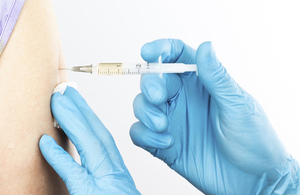Companies sentenced for supplying hospitals with defective pre-filled syringes
A major healthcare company and a sister company have been sentenced for supplying hospitals with defective pre-filled syringes.

An injection into an arm
A major healthcare company and a sister company that sold a range of ready-to-use pharmaceutical products it manufactured have been sentenced for supplying hospitals with defective pre-filled syringes that contributed to the death of a diabetic patient.
Neil Judge, from Barnsley, died at the Northern General Hospital in Sheffield in November 2010 after being treated with a batch of intravenous insulin syringes that actually contained no insulin.
He suffered multi-organ failure triggered by a serious episode of diabetic ketoacidosis because his body was deprived of insulin for more than 13 hours.
The faulty syringes were supplied to Sheffield Teaching Hospitals NHS Foundation Trust by Fresenius Kabi Ltd as a licenced wholesaler for Calea UK Ltd, which manufactured the product.
Both companies, based at the same address in Runcorn, Cheshire, were fined at Sheffield Crown Court today (9 July) after being prosecuted by the Medicines and Healthcare products Regulatory Agency (MHRA).
Fresenius Kabi was convicted for its role in a ‘medicinal failure’ that a coroner had earlier ruled was a ‘major contributory factor’ in Mr Judge’s death.
The court heard that supplying faulty syringes wasn’t an isolated incident and that Calea also manufactured a batch of pre-prepared Tobramycin syringes – used to treat infections - that were administered to a patient with cystic fibrosis at the Royal Shrewsbury Hospital in August 2011.
On this occasion, the syringes, which were prepared and delivered direct for the patient by Calea, were each found to contain 3 times the prescribed daily dose.
The over medication came to light after the patient reported an adverse reaction described as a fizzing sensation, although there were no lasting effects.
The court was told the 2 incidents followed a series of inspections by MHRA officials that highlighted deficiencies at the Runcorn site where Calea and Fresenius Kabi operated. They included concerns that there was no investigation regime in place to identify potential defects and prevent future recurrence when defective products were detected.
Fresenius Kabi Ltd, of Eastgate Way, Manor Park, Runcorn, was fined a total of £500,000 and ordered to pay a further £5,900 in costs after pleading guilty to breaching Sections 64(1) and 67(2) of the Medicines Act 1968.
Calea UK Ltd, of the same address, was fined £50,000 with £5,900 costs after also pleading guilty to similar breaches.
After sentencing, Alastair Jeffrey, MHRA Head of Enforcement, said:
“Fresenius Kabi Ltd and Calea UK Ltd are equally responsible for the medicinal failure that was a major contributing factor in the tragic death of Neil Judge, who was deprived of the vital insulin his body needed because of a serious manufacturing error.
“Thankfully the patient who was administered an overdose of tobramycin was relatively unharmed, but the consequences could have been more serious had hospital staff not responded to his complaints.
“The 2 companies are very closely linked, and the onus is on them both to produce and supply products that are fit for purpose and that conform to precise specifications for each and every batch.
“I hope this case serves as a clear reminder to others, as MHRA will not hesitate to take enforcement action when serious failings occur.”
Background
-
The Medicines and Healthcare products Regulatory Agency (MHRA) is responsible for regulating all medicines and medical devices in the UK by ensuring they work and are acceptably safe. All our work is underpinned by robust and fact-based judgements to ensure that the benefits justify any risks. MHRA is a centre of the Medicines and Healthcare products Regulatory Agency which also includes NIBSC and CPRD. The Medicines and Healthcare products Regulatory Agency is an executive agency of the Department of Health.
-
Section 64(1) of the Medicines Act 1968 states: “No person shall, to the prejudice of the purchaser, sell any medicinal product which is not of the nature or quality demanded by the purchaser.”
-
Section 67(2) states: “Any person who contravenes any of the following provisions of this Part of this Act, that is to say, sections 52, 58, 63, 64 and 65, or who contravenes any regulations made under section 60 or section 61 or any order made under section 62 of this Act, shall be guilty of an offence.”
Media enquiries
News centre
MHRA10 South Colonnade
London
E14 4PU
Email newscentre@mhra.gov.uk
Telephone (including out of hours): 020 3080 7651